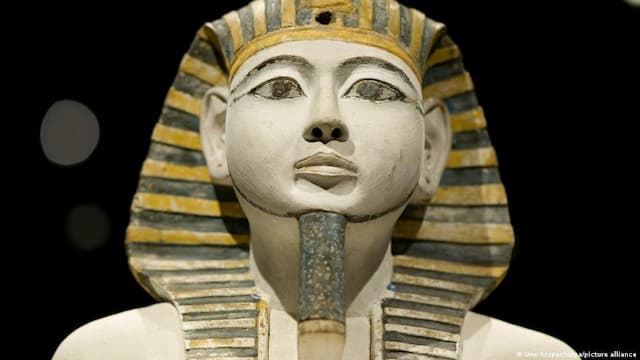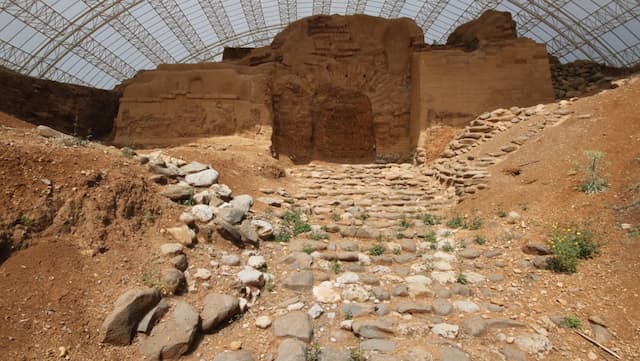Why did Jesus have to die? (Matthew 26:47-56)
How did Jesus’ death “fulfill the prophetic Scriptures?” Here’s the explanation he gave in Gethsemane.
Fight or flight? Many kings have faced that choice. In a field just outside his capital, the true king rejected both options. Neither would bring peace to a divided world.
If you don’t flee and you don’t fight, you could die. Not very attractive, but it is an option: stay and die.
Instead of taking flight, Jesus stayed in Gethsemane, consulting his Father, the architect of human history. He triple-checked for any other alternatives (26:36-46). When the crowd with swords and clubs arrived to take him, he rejected the fight option too.
Matthew doesn’t name Peter as the disciple who unsheathed a dagger. It’s too late for flight. He sees no option but to fight for his king. He swings his sword. The high priest’s servant sees it coming and drops his head to one side. The blow aimed at his neck slices off his ear.
The king orders him, Put your sword back in its place! All who take the sword will destroy themselves with the sword.
What astounding insight! Jesus wasn’t merely saying that those who rely on weapons for survival probably won’t. He said the very act of choosing weapons to kill humans destroys our own humanity (απολουνται = future indicative middle).
Ask returning soldiers who’ve seen killing whether Jesus is right. Ask them how many friends they’ve lost to the spectrum from shellshock to suicide. War destroys more than the enemy.
But what sort of option is stay and die? Is that what the Scriptures required of him? It’s not what previous kings had chosen.
Israel wanted a king to lead us and to go out before us and fight our battles (2 Samuel 8:20). They celebrated heroic kings: Saul has slain his thousands, and David his tens of thousands (1 Samuel 18:7; 21:11; 29:5). The father of the kings was remembered like this:
2 Samuel 22:38–41 (NIV)
38 I [David] pursued my enemies and crushed them;
I did not turn back till they were destroyed.
39 I crushed them completely, and they could not rise;
they fell beneath my feet.
40 You [God] armed me with strength for battle;
you humbled my adversaries before me.
41 You made my enemies turn their backs in flight,
and I destroyed my foes.
In destroying his foes, David believed he was acting as the anointed servant of the covenant God. In the words of the Torah:
Deuteronomy 32:39–42 (NIV)
39 “There is no god besides me. …
As surely as I live forever,
41 when I sharpen my flashing sword
and my hand grasps it in judgment,
I will take vengeance on my adversaries
and repay those who hate me.
42 I will make my arrows drunk with blood,
while my sword devours flesh:
the blood of the slain and the captives,
the heads of the enemy leaders.”
Jesus’ response to Peter seems to conflict with the story of Scripture. God’s anointed rulers had always fought. To this day, many of his fellow-Jews reject Jesus as their messiah because he failed to save his people.
The truth is that the kings had not been able to save their people. When the last God-appointed king led his troops to Megiddo to stop the Egyptian army passing through the land, he was struck down. God’s flock was scattered in exile.
By Jesus’ time, they had been under foreign rule longer than under their own kings. The prophets in this period promised the return of God’s anointed king. Zechariah said the king would arrive with a victory that came by doing right, not by making war with the nations:
Zechariah 9:9–11 (NIV)
9 Rejoice greatly, Daughter Zion!
Shout, Daughter Jerusalem!
See, your king comes to you,
righteous and victorious,
lowly and riding on a donkey,
on a colt, the foal of a donkey.
10 I will take away the chariots from Ephraim
and the warhorses from Jerusalem,
and the battle bow will be broken.
He will proclaim peace to the nations.
His rule will extend from sea to sea
and from the River to the ends of the earth.
11 As for you, because of the blood of my covenant with you,
I will free your prisoners from the waterless pit.
This was what Jesus believed the Scriptures called him to do. He enacted it at the beginning of the week (21:1-10). He had no doubt that the God of Israel had the forces to defend him, but that wasn’t the right approach. That’s why he rebuked the disciple who unsheathed his sword: Don’t you understand I could call on my Father and he will support me with more than a dozen regiments of angels?
Jesus does not expect angelic deliverance. It’s not how he understands the Scriptures. He explains this to his friends (26:54). And to his enemies (26:56).
The blood of the covenant (a phrase Jesus borrowed from Zechariah) was not about killing his enemies. The king was offering his own blood as a peace treaty, to rescue his people and re-establish the covenant where God is sovereign. He would stay and die.
In arming themselves against him, the crowd was projecting their own violent attitudes on him: You came out with swords and clubs to capture me as if I was a terrorist? (26:55).
His arrival exposed their sinfulness, but the king was not prosecuting a case against them. On the contrary, he was here to bear their failures on his own shoulders, to save his people. That’s the reason for his name (Matthew 1:21). This is what the prophets have asked of him, how the violence of the world is borne away by the king who absorbs the violence in his own being and restores God’s reign over us — all that the Scriptures have promised.
God has chosen the third option. He has not sent regiments of angels to protect his anointed. Neither has he abandoned his anointed to the realm of the dead (Psalm 16:9-11). As the servant of the Lord announcing the good news of God’s reign, the king shoulders the suffering of his people as the means of restoring them to God’s reign (Isaiah 52:7 – 55:3). He enters the death of his people, raised up by the Spirit as their Davidic king in a new covenant of peace (Ezekiel 37:1-28). Only in him can his people rise again on the third day (Hosea 6:2).
Which passages from the Prophets did Jesus have in mind when he said, This whole thing has happened in fulfilment of the prophetic Scriptures? (26:56). There’s one passage we can be certain of — the one Jesus consistently alluded to as he made his way to Jerusalem for the final time. Zechariah 9–14 is the story of a king returning in peace, being pierced by the nations, the divinely appointed shepherd being struck down, yet rising to lead his people into the day of the Lord, the restorative reign of God over Israel and the nations.
That’s why Jesus rejected fight or flight, choosing to stay and die.
The history of the world — of Israel and the nations — was falling and rising in our king.
The text
Matthew 26:47-56 (my translation, compare NIV)
47 While Jesus was still speaking, Judas (one of the twelve) arrived. With him was a large crowd with swords and clubs, sent from the ruling priests and elders of the people. 48 The one handing him over gave them a sign: “The person I greet is the one. Arrest him.” 49 Directly approaching Jesus, he said, “Pleased to see you, rabbi!” and hugged him.
50 Jesus said to him, “Comrade, what are you here for?” Then they came and grabbed hold of Jesus and arrested him.
51 And look, one of those with Jesus reached out his hand, drew his sword, and struck the high priest’s servant, cutting off his ear.
52 Then Jesus says to him, “Put your sword back in its place. For all who take up a sword will destroy themselves with the sword. 53 Don’t you understand I could call on my Father and he will support me with more than a dozen regiments of angels? 54 But how would the Scriptures be fulfilled that say it must happen this way?”
55 That was the moment Jesus said to the crowds, “You came out with swords and clubs to capture me as if I was a terrorist? I was sitting in the temple, teaching every day, and you didn’t arrest me. 56 This whole thing happened in fulfilment of the prophetic Scriptures.” Then his disciples left him and fled.
Related posts
- Why did Jesus die? (Mat 26:1-5)
- How Jesus explained the cross (Mat 20:17-19)
- Son of man: suffering king (Mat 16:21–17:23)
- His kingdom in a violent world (Mat 5:43-48)
- Jesus on war: pacifism, or just war?
- Should Christians go to war? (Rom 13:1-7)
Seeking to understand Jesus in the terms he chose to describe himself: son of man (his identity), and kingdom of God (his mission). Riverview College Dean
View all posts by Allen Browne










